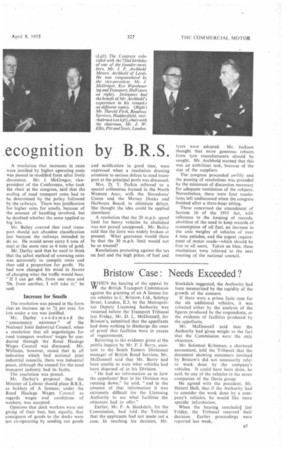Bristow Case: Needs Exceeded ?
Page 41

If you've noticed an error in this article please click here to report it so we can fix it.
WHEN the hearing of the appeal by the British Transport Commission against the granting of an A licence for six vehicles to C. Bristow, Ltd., Solebay Street, London, E.3, by the Metropolitan Deputy Licensing Authority was resumed before the Transport Tribunal last Friday, Mr. D. L. McDonnell, for Bristow's, submitted that the appellants had done nothing to discharge the onus of proof that facilities were in excess of requirements.
Referring to the evidence given at the public inquiry by Mr. F. J. Barry, assistant to the South Eastern Divisional manager of British Road Services, Mr. McDonnell said that Mr. Barry had been unable to state what vehicles had been disposed of in his Division.
"He had no information as to how the appellants' fleet in his Division was running down," he said, "and in the absence of that information it was extremely difficult for the Licensing Authority to see what facilities the objectors had to offer."
Earlier, Mr. F. A. Stockdale, for the Commission, had told the Tribunal that the applicants had not made out a case. In reaching his decision, Mr.
Stockdale suggested, the Authority had been mesmerized by the rapidity of the growth of the concern.
lf there were a prima facie case for the six additional vehicles, it was rebutted either by the analysis of the figures produced by the respondents, or the evidence of facilities produced by the appellants.
Mr. McDonnell said that the Authority had given weight to the fact that the Commission were the only objectors.
Mr. Solomon Kriteman, a chartered accountant, told the Tribunal that the document showing customers invoiced by Bristow's did not necessarily refer to work done by the company's vehicles. It could have been done, he said, by any of the vehicles in the seven companies of the Davis group.
He agreed with the president, Mr. Hubert Hull, that if the Authority had to consider the work done by a company's vehicles, he would like more specific information.
When the hearing concluded last Friday, the Tribunal reserved their decision. Earlier proceedings were reported last week.




























































































